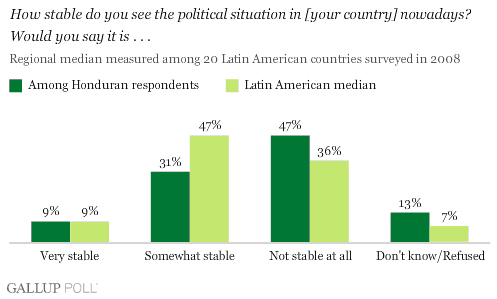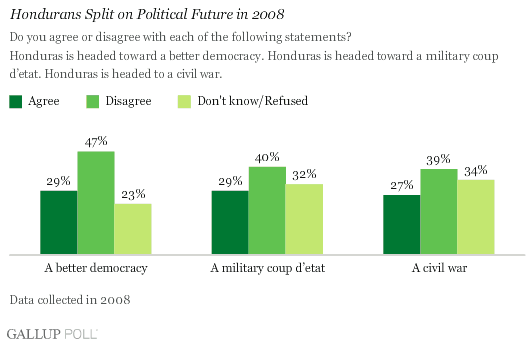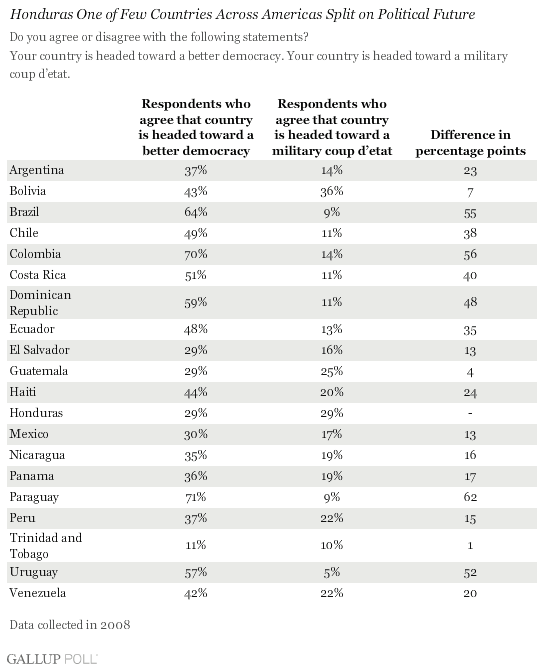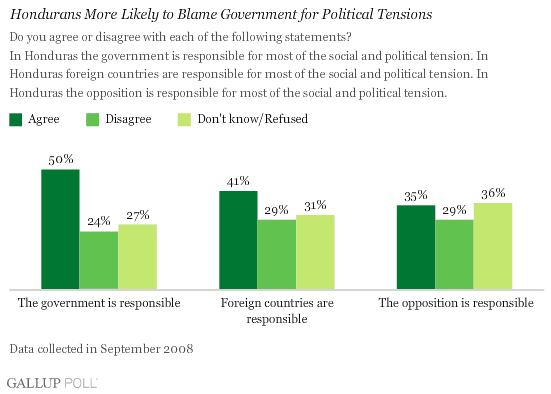WASHINGTON, D.C. -- Honduras' ousted President Manuel Zelaya is vowing to return to his country, days after troops deposed him from presidential office, and Roberto Micheletti was appointed as interim leader. When Gallup last surveyed Hondurans in September 2008, 47% said the political situation in their country was not stable at all. This is 11 percentage points higher than the Latin American median (36%) in 2008. Another 40% of Hondurans said the political situation was either somewhat or very stable, which is lower than the 55% regional median.

Gallup also asked Hondurans a series of questions about their country's future. When asked whether they agreed or disagreed that their country was headed toward a military coup d'etat, 29% of respondents agreed, which is a high percentage by Latin American standards, where the regional median was 15% in 2008. Also, when asked whether they agreed or disagreed that their country was headed toward a better democracy, nearly one in two respondents disagreed, and only 29% agreed.

Hondurans' attitudes were unique compared with those of other residents surveyed in Latin America in 2008. Honduras was one of few countries in the region where respondents were as likely to agree their country is headed toward either a better democracy or a military coup d'etat (differences in the percentages in Guatemala and Trinidad and Tobago are within the margin of error). In most other nations, respondents were more likely to say their country is headed toward a better democracy than headed for a military coup.

Altogether, the data suggest that Hondurans perceived political instability in 2008, and nearly half disagreed that the country is headed toward a better democracy. Interim leader Micheletti has recently blamed outside influences for the country's instability, saying the current coup saved Honduras from further influence by Venezuelan-style socialism or "Chavismo."
Gallup also asked Hondurans in 2008 whether they agreed or disagreed with various statements about parties that were potentially responsible for social and political tension. One in two respondents in 2008 agreed that the government is most responsible. Slightly smaller percentages -- 41% and 35%, respectively -- agreed that foreign governments and the political opposition were most responsible.

Survey Methods
Results are based on face-to-face interviews conducted with 1,000 adults, aged 15 and older, in Honduras in September 2008. For results based on the total sample of national adults, one can say with 95% confidence that the maximum margin of sampling error is ±3.3 percentage points. In addition to sampling error, question wording and practical difficulties in conducting surveys can introduce error or bias into the findings of public opinion polls.
Jesus Rios and Johanna Godoy contributed to this article.
